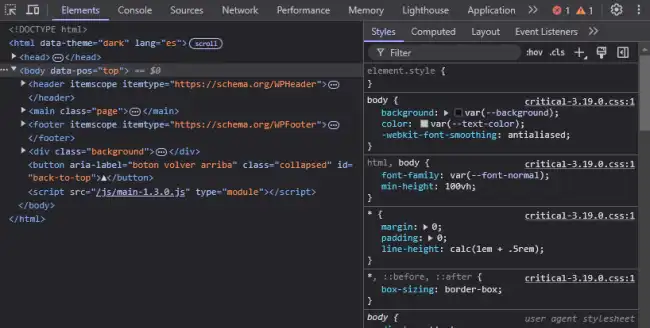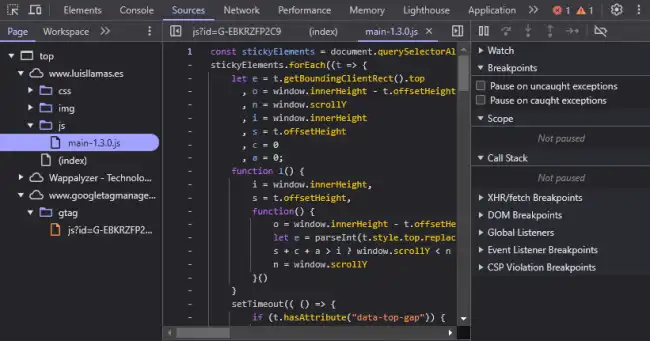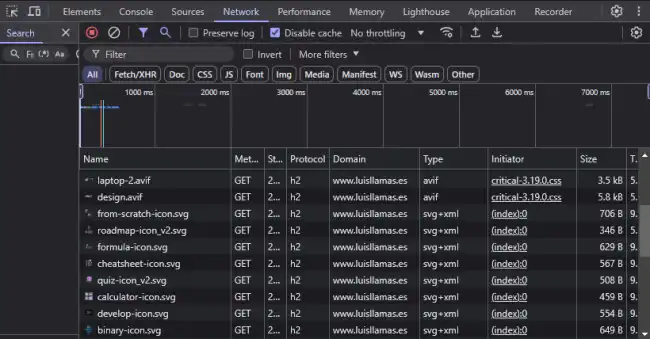Developer Tools (simply DevTools) are built-in tools in modern browsers to make developers’ lives easier.
They allow us to analyze, debug, and optimize both JavaScript code and other elements of our web applications.
Learning to use them can save you time and effort when it comes to troubleshooting or improving your code.
So let’s take a look 👇
Accessing DevTools
You can open DevTools in several ways, depending on the browser you use. Here are some of the most common methods:
- Right-click anywhere on the page and select Inspect.
- You can also use the keyboard shortcut Ctrl + Shift + I (Windows) or Cmd + Option + I (Mac).
- Right-click > Inspect
- Or the shortcut Ctrl + Shift + I (Windows) or Cmd + Option + I (Mac).
- First, you need to enable the developer tools in the advanced preferences.
- Then, right-click > Inspect Element.
In general, Ctrl + Shift + I or F12 are almost a standard.
Main Panels of DevTools
Once opened, you’ll see an interface divided into panels, each with a specific functionality. I’ll explain the most important ones for working with JavaScript.
Console Panel
In the Console Panel, you can interact directly with the browser’s JavaScript interpreter by typing commands.

This is also where errors, warnings, and messages that you’ve logged using console.log are displayed.
For example, you can try copying and pasting this
console.log("Hello from the console");
console.error("This is an error message");
console.warn("Warning: Something is not right");
In the console, you can test code snippets in real-time, debug errors, and analyze your application’s behavior.
Elements Panel (DOM and CSS)
The Elements panel allows you to inspect and modify the DOM and CSS of a page in real-time.
- You can select elements from the page to see their properties.
- You can also modify styles directly from here and see the changes instantly.

Debugging Panel (Sources)
The Sources panel allows you to debug your JavaScript code.

This panel allows you to:
- Set breakpoints to pause code execution at specific moments.
- Inspect variables and their state in real-time.
- Navigate between the different files and scripts loaded by your application.
function add(a, b) {
debugger; // This pauses execution here
return a + b;
}
add(3, 4);
By writing debugger in your code, you can pause execution and analyze the value of variables at that moment using the Sources panel.
Network Panel
The Network panel shows all requests made by your application, including HTML, CSS, JavaScript files, images, and AJAX requests.

Here you can:
- Check load times.
- Inspect the data sent and received in API requests.
- Identify errors in the responses.
Performance Panel
The Performance panel allows you to measure and analyze the performance of your page. Here you can:
- Record rendering times.
- Identify bottlenecks in your code execution.
- Improve load speed and interaction.
If your application is slow, this panel is your best friend for finding the cause and optimizing it.
General Tips
- Experiment without fear: You can modify styles and elements directly in DevTools without affecting your original code.
- Use the debugger: It will allow you to analyze step by step what is happening in your code (without having to use so much console.log)
- Filter messages in the console: If you have too much information, use filters to focus on specific errors or warnings.
- Analyze HTTP requests: Use the Network panel to detect errors in communication with APIs.
